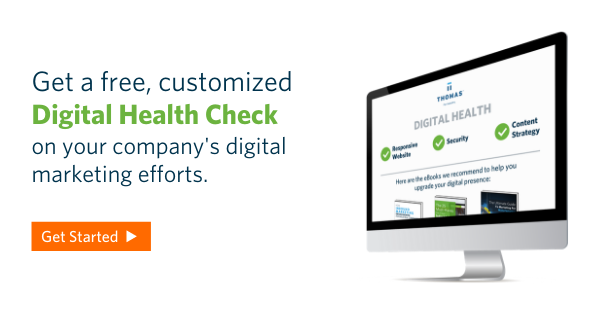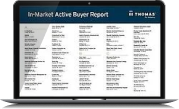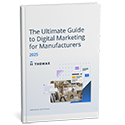How To Become A Private Label Manufacturer
Team Thomas August 20, 2020
We hear from our manufacturing customers that they want to break into a new industry or find a hidden market. But without finding out what the Total Available Market is, you could be going after something that’s not there. Luckily for those looking to tap into the private label industry, there’s an opportunity for growth. Demand from buyers seeking private label manufacturers has grown 45% on Thomasnet.com YoY/QoQ/MoM.
Suppose you’re planning on extending your services to private labeling and targeting industries that use private labels. How can you drive growth, through both new business and growth of existing customers?
Best Practices For Tapping Into A New Industry
Before you do anything, you need to figure out what reality looks like. Your research should help you see how your current products and services can be used in the market you’re going after. It should also give you an estimate of how often buyers are sourcing for new companies with your services to add to their supply chain.
Familiarize Yourself With Industry Trends And Resources
Take a look at census data, do a competitive analysis, dig into LinkedIn, use Thomas WebTrax to review the industries already checking out your company, and review the findings published by firms such as Gartner and Forrester to see growth potential. Hundreds of manufacturers review sourcing data to understand what their prospects are searching for. Access the latest sourcing activity report here to help you make smarter decisions that contribute to your company's bottom line. But the research shouldn’t stop there.
Become a member of the Private Label Manufacturing Association to get insight into the latest private label industry news. Alternatively, you can subscribe to industry’s leading newsletter, Thomas Industry Update, and get the latest manufacturing insights delivered to your email daily.
Understanding the latest stats and trends will give you a look into your prospects’ needs, how long the industrial buying process should take, and how to create content to address their needs.
Take a look at Sourcing Trend Data to see where private label manufacturing ranks on the list of most sourced services by procurement professionals and engineers
on Thomasnet.com in Q2 2020
Understand Different Industry Regulations
For OEMs, a private label certification provides a unique selling point for your product because certifications confirm authenticity. For example, manufacturers who are Cradle to Cradle certified are recognized as companies who are creating sustainable products.
Numerous markets use private labels, so make sure you’re familiar with different industry regulations. Whether the customer needs a high-performance label or advanced die-cut adhesive, all your engineering should be backed by certified quality management systems and facilities, like ISO 9001:2015 and IATF (TS) 16949:2016. The more you understand the markets, the better partner you will be to your potential customers.
Related: Are Your Certifications Helping You Win More Business?
Expanding Services Into Private Labeling
To meet the needs of a new market like the private label industry, your company’s culture should be built upon continuous improvement, lean manufacturing, and innovation.
Do you have the right teams to communicate the difference between digital printing vs. screen printing vs. flexographic printing? Do you have the right systems and technologies to support those jobs? Do you have on-site machinery to weather test and peel-test the labels? Make sure your shop is fully capable of tackling the complexities of private labeling.
Using Digital Marketing To Grow Your Business
At this phase of your plan to reach private label customers, your main goal should be to let people know who you are, what you do, and how you can help them. You do this by starting conversations, not by pitching products. Create content centered on private labeling and the ways you solve your customers’ challenges — Tailor Labeled Products showcases the quality of their work through detailed capability pages and quality images.
Design your site the way your customers search. Industrial buyers want to know exactly what your company can do – and they don't want to have to work hard to figure it out. When the design firm IDEO rolled out the airplane lav "Occupied" sign, they recognized a common traveler's frustration— taking the time to walk back, unsure of the status, often in a time of urgent need — and they addressed it.
Procurement frustration can be very similar. Purchasers don't have a lot of time to figure out if you can meet their needs — make sure your site answers their initial questions as clearly and quickly as possible, and then be sure to include the detailed specs and product examples that they'll want to see as they investigate further. Don't make them wait for a phone call or RFQ response to answer basic questions.
Be where potential buyers spend their time when they're not sourcing. Create compelling content to share on social media and your blog, and make sure you have ads where buyers look for industry news or research. Execute advertising and promotional campaigns, like a spotlight article in an email newsletter, that links to your website and reaches your new potential customers by job function. You'll strengthen your brand and stay top-of-mind for the customers you want to attract, by working within their natural information-gathering behavior.
Always create appealing, interesting, shareable content. Know what your buyers value, and build your digital strategy around that. Whether its education, familiarity, emotion, humor, or any number of other factors, your content should always be designed to offer something to your audience.
Thousands of North American suppliers list their businesses on Thomasnet.com to increase their digital footprint. Build your company profile with a category list of your services to target buyers looking for private label services.
While we wish there were a magic bullet to bring in those big contracts in your desired industries, it all comes down to research, a data-backed plan, and a robust digital marketing strategy to penetrate new markets. If your manufacturing company needs help breaking into a new industry, contact our engineers and marketing strategists. We offer a free digital health check to see what efforts you can improve online.
Other Industrial Resources To Grow Your Business:
- Industry insight: Challenges And Opportunities In Private Label Manufacturing
- Selling tips: How To Sell Your Industrial Products And Services To Your 4 Most Difficult Customers
- Industrial data: Why There's A Disconnect Between Stock Prices And Industrial Production
- Free video content production services to showcase your shop floor to potential customers and close more sales when travel is limited.
- An email newsletter sponsorship that gets read by the exact industries and job titles you want to do business with.
- A display ad on Thomasnet.com search result pages where buyers search for your disinfectant products or cleaning services.
- An in-market buyer report to see exactly which companies are searching for the services you offer.
Did you find this useful?






![How To Meet The Needs Of B2B & Industrial Buyers [Updated 2022]](https://blog.thomasnet.com/hubfs/Brainstorm%20meeting%20understanding%20B2B%20buyers.png)




